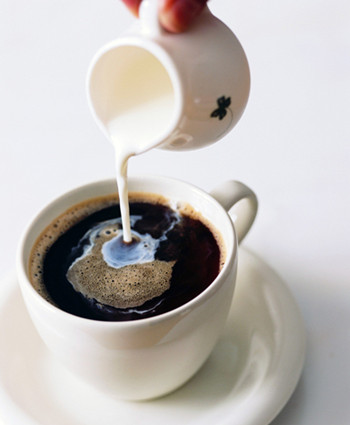How to judge caffeine addiction in children Coffee common sense
There are hundreds of energy drinks on the market in the United States, and many children find it difficult to resist them. "It lifts the spirits," said Mani Causey, an eighth-grader in California. "Marni is 14 and drinks her favorite high-sugar caffeinated drink three or four times a week. If she goes out to play basketball, she especially wants to drink energy drinks to "cheer up." But one thing these different brands of energy drinks have in common is that they contain a lot of caffeine, which can cause serious harm to the developing bodies of children and teenagers.

Energy drink poisoning is like an overdose.
Energy drinks are now a $4.9 billion industry in the United States, with hundreds of new drinks coming on the market in 2006, many of which contain one to three times more caffeine than traditional sodas, according to Beverage Digest magazine. The same is true of specialty coffee, which is so high in sugar and calories that it is tantamount to swallowing a chocolate bar directly into the stomach. Teenagers in primary and secondary schools are addicted to caffeine, which can have serious consequences for their developing bodies.
In St. Louis, it is common for local teenagers to queue up for specialty coffee (such as mocha coffee) before going to school. Pediatric cardiologist Angela Schach believes that child addiction seems to be on the rise. Over the past five years, Dr. Xia Qi has seen more and more patients, with symptoms including dizziness and fainting. "These kids are dehydrated because they drink nothing but caffeinated drinks all day," she said. "She sent sick children back to school with a bottle of water and diagnostic instructions, suggesting that these students should be allowed to drink water in class. Caffeine intake can have more serious consequences, she said, such as rapid heartbeat, palpitations and even seizures.
Stephen Martinelli, a 16-year-old sophomore from Quinnett County, Georgia, decided to give it a try when he heard about a new brand of energy drink (with a high caffeine content of 280 milligrams) called Cocaine. Dan Mayer, 25, tried dozens of different brands and posted the results on his blog, Energy Drink Review. After drinking 3/4 cans of "cocaine," Martinelli became dizzy and vomited and was taken to the emergency room for an IV. Emergency room doctors initially thought he had overdosed, he said. Blood and urine tests revealed he was dehydrated from caffeine poisoning.
Coco base drinks have been banned.
How to judge caffeine addiction in children
All beverage manufacturers claim that they do not sell caffeine-rich drinks aimed at children, but energy drinks are ubiquitous in teenage hangouts.
How popular are energy drinks? Some people post photos to Myspace with a bunch of their favorite drinks, proclaiming to the world how many bottles they can drink. Some teens even post videos of energy drink binges (drilling holes in the bottom of cans and drinking them all in one gulp) on YouTube, so it's no wonder emergency room doctors and pharmaceutical experts across the country are seeing an increase in caffeine-related symptoms among young people. Guy Xiucha, a doctor at the University of California School of Medicine in San Francisco, recently treated an 18-year-old patient who arrived in an ambulance with a heart rate of 220 beats, well above the normal range of 60 to 100. The patient, who had just graduated from high school, drank eight 16-ounce cans of Rockstar a day to perk up for the night shift.
Caffeine poisoning isn't the only thing some pediatricians worry about. In an era of growing childhood obesity, doctors are loath to see new ways to encourage children to drink lots of calories without nutrients. Many children suffer from sleep deprivation after excessive caloric intake. According to the American Sleep Foundation, more than half of adolescents aged 11 to 17 sleep less than eight hours a night.
Even when it comes to important times like school exams, excessive caffeine consumption can be a small gain and a big loss. A cup of coffee may give you a brief boost in concentration, but several cans of energy drinks or a whole pot of coffee in a row can have the opposite effect. "Your attention is decreasing rather than increasing. Dr. Tariq Bay, professor of emergency medicine at the University of California, said,"You become hyperalert and have trouble processing the information in front of you. "
Many adults may drink up to 300 milligrams of caffeine a day, the equivalent of several cups of strong coffee, without experiencing side effects such as discomfort, but caffeine can have serious effects on children. What's more, most energy drinks contain ingredients that accelerate the effects of caffeine. For this, please refer to the contents of taurine and guarana marked on the beverage packaging.
Signs of caffeine overabsorption include nervousness, anxiety, insomnia, shivering, nausea, or diarrhea. What is a reasonable caffeine intake for a child or teenager? Many pediatricians would say bluntly that any caffeine intake is too much. Pediatric nutritionist Dr. Margaret Savoca said: "Children should not be consuming caffeine at all. "She found that caffeine intake of more than 100 mg per day was associated with high blood pressure in adolescents.
How do you know if your child is addicted to caffeine? See what symptoms they have if they haven't had energy drinks or caffeine in 24 hours; if they have drowsiness, lack of energy, or headaches, they have to cut back. Fortunately, this addiction is much easier to get than detoxification, and you can quit if you want.
Important Notice :
前街咖啡 FrontStreet Coffee has moved to new addredd:
FrontStreet Coffee Address: 315,Donghua East Road,GuangZhou
Tel:020 38364473
- Prev

Coffee common sense middle-aged and elderly people drinking coffee in moderation can prevent dementia
Drinking moderate amounts of coffee can prevent and delay Alzheimer's disease, according to a long-term follow-up study released by Finnish and Swedish researchers. The study found that middle-aged people who drank three to five cups of coffee a day were 65% less likely to develop Alzheimer's disease in old age than those who drank less than two cups of coffee a day and five or more cups of coffee a day. Evidence of some previous research results
- Next

Boutique Coffee Common sense how long will it take for coffee to be refreshing
Researchers at the University of Barcelona in Spain recently found that it takes only 10 minutes for coffee to be refreshing. The maximum amount of caffeine entering the bloodstream is 45 minutes, but it takes only a few minutes to reach half of the maximum. It is reported that men are more sober than women after drinking espresso. They analyzed 688 college students and measured them before and after drinking coffee for 10 minutes, 20 minutes and 30 minutes.
Related
- Beginners will see the "Coffee pull flower" guide!
- What is the difference between ice blog purified milk and ordinary milk coffee?
- Why is the Philippines the largest producer of crops in Liberia?
- For coffee extraction, should the fine powder be retained?
- How does extracted espresso fill pressed powder? How much strength does it take to press the powder?
- How to make jasmine cold extract coffee? Is the jasmine + latte good?
- Will this little toy really make the coffee taste better? How does Lily Drip affect coffee extraction?
- Will the action of slapping the filter cup also affect coffee extraction?
- What's the difference between powder-to-water ratio and powder-to-liquid ratio?
- What is the Ethiopian local species? What does it have to do with Heirloom native species?

